Mutton on the menu, JD(U)’s Lalan Singh faces Opposition ire: ‘Classic double standards’

Patna, July 18 — A recent feast hosted by Janata Dal (United) leader and Rajya Sabha MP Lalan Singh has ignited a political storm, drawing harsh criticism from Opposition parties and social groups alike. The controversy? Reports suggest that non-vegetarian dishes, including mutton, were served at the gathering — all while the month of Sawan, considered highly sacred by Hindus, is underway.
The backlash was swift and intense. Political opponents, particularly from the Bharatiya Janata Party (BJP), lashed out at the JD(U) and Lalan Singh, accusing them of hypocrisy and insensitivity. In Bihar, where caste, culture, and religion are deeply intertwined with politics, such controversies tend to gain traction fast — and this was no exception.
Why Sawan Matters
The month of Sawan (or Shravan), which typically falls between July and August, is considered one of the holiest months in the Hindu calendar. Devotees of Lord Shiva observe fasts, offer prayers, and often abstain from eating meat and alcohol as a mark of reverence. In regions like Bihar, Jharkhand, and Uttar Pradesh, these customs are not just religious practices — they are part of the social fabric.
In this context, the alleged act of serving mutton during a political gathering has been viewed as culturally tone-deaf and disrespectful.
BJP Hits Out: ‘Classic Double Standards’
Reacting strongly, BJP spokespersons slammed the JD(U) for what they called “classic double standards.”
“JD(U) leaders talk about respecting cultural traditions and maintaining communal harmony. But when it comes to practice, they fail miserably. Organizing a mutton feast during Sawan is not just disrespectful to Hindu sentiments — it exposes their hypocrisy,” said Sanjay Singh Tiger, BJP spokesperson in Bihar.
Other BJP leaders echoed the sentiment, alleging that such acts were part of a broader pattern of appeasement politics.
Social Media Reactions: Hashtags and Outrage
The controversy quickly spilled onto social media, where hashtags like #SawanKaApmaan, #JDUDoubleStandards, and #LalanSinghFeast began trending in Bihar’s political circles. Several users criticized the JD(U) for insensitivity and demanded a public apology.
Some users posted memes mocking the event, while others raised concerns about the use of religious symbolism in politics.
One user wrote, “They celebrate Sawan in speeches but feast on mutton in reality. These are our netas.”
JD(U)’s Silence and Internal Reactions
Interestingly, Lalan Singh and his party have not issued any formal statement regarding the incident. Sources within the JD(U) suggest that the event in question was a private dinner, not a public or political function.
However, this explanation has failed to calm the storm. Political analysts argue that a leader of Singh’s stature must be conscious of public perception, especially during sensitive times like Sawan.
“There is no such thing as a ‘private’ gathering when you’re a public figure,” said Dr. Ranjan Sharma, a Patna-based political observer. “The food you serve, the words you say — everything is symbolic. This issue may look minor, but in Bihar’s political climate, it can snowball.”
Cultural Sensitivity vs Political Strategy
This episode once again highlights the fragile balance that Indian politicians must strike between cultural sensitivity and political pragmatism. Bihar, with its complex social structure of castes and communities, has always been a hotbed of identity politics. In such an environment, even a menu can spark controversy.
Some critics argue that the Opposition’s outrage is performative, meant to score political points ahead of the 2025 Bihar Assembly elections. Others see this as a genuine issue of cultural disrespect.
Past Controversies Around Food and Faith
This isn’t the first time Indian politics has been rocked by a controversy around food habits and religion. In the past, there have been debates over the beef ban, canteen menus in government offices, and even the dietary preferences of students in hostels. Each of these issues, though seemingly personal, has had massive political fallout.
Food, in India, is more than just nourishment. It is identity, culture, and — increasingly — a political flashpoint.
What Lies Ahead?
For Lalan Singh and the JD(U), this controversy couldn’t have come at a worse time. The party is in the midst of redefining its political alliances and image after a turbulent few years. With Bihar’s political landscape shifting, even minor issues are magnified under the public lens.
Whether the mutton controversy will have any lasting impact remains to be seen. But for now, it has certainly put the spotlight on the double standards that critics allege plague many political parties — especially when it comes to walking the talk on cultural and religious sensitivity.
As the Sawan month continues and the political mercury rises, Bihar’s leaders would do well to remember that symbolism matters — even on the dinner plate.






